Leadership and Management Report: Contemporary Definitions and Skills
VerifiedAdded on 2023/06/12
|18
|6108
|265
Report
AI Summary
This report delves into the multifaceted realm of leadership and management, examining their contemporary definitions, roles, and responsibilities within a business context. Section 1 critically evaluates the differences and similarities between leaders and managers, highlighting the alignment or divergence of these concepts, and assessing their purpose and value in organizations. Section 2 focuses on essential skills for leaders and managers in the 21st century, including academic rationale and a personal development plan. It identifies critical skills and behaviors, emphasizing their value in personal and organizational growth. The report provides comprehensive insights into effective leadership and management practices, supported by references to relevant academic sources.
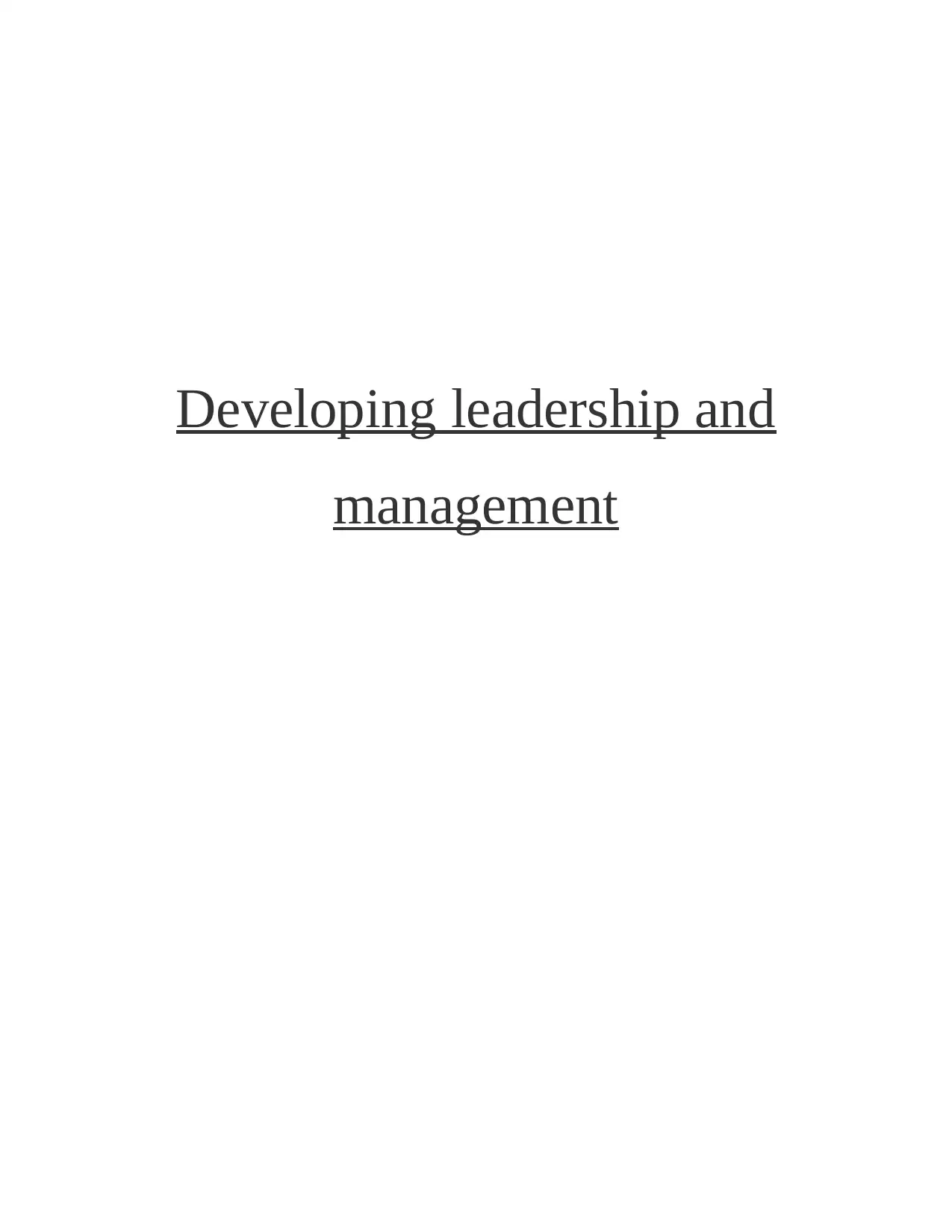
Developing leadership and
management
management
Paraphrase This Document
Need a fresh take? Get an instant paraphrase of this document with our AI Paraphraser
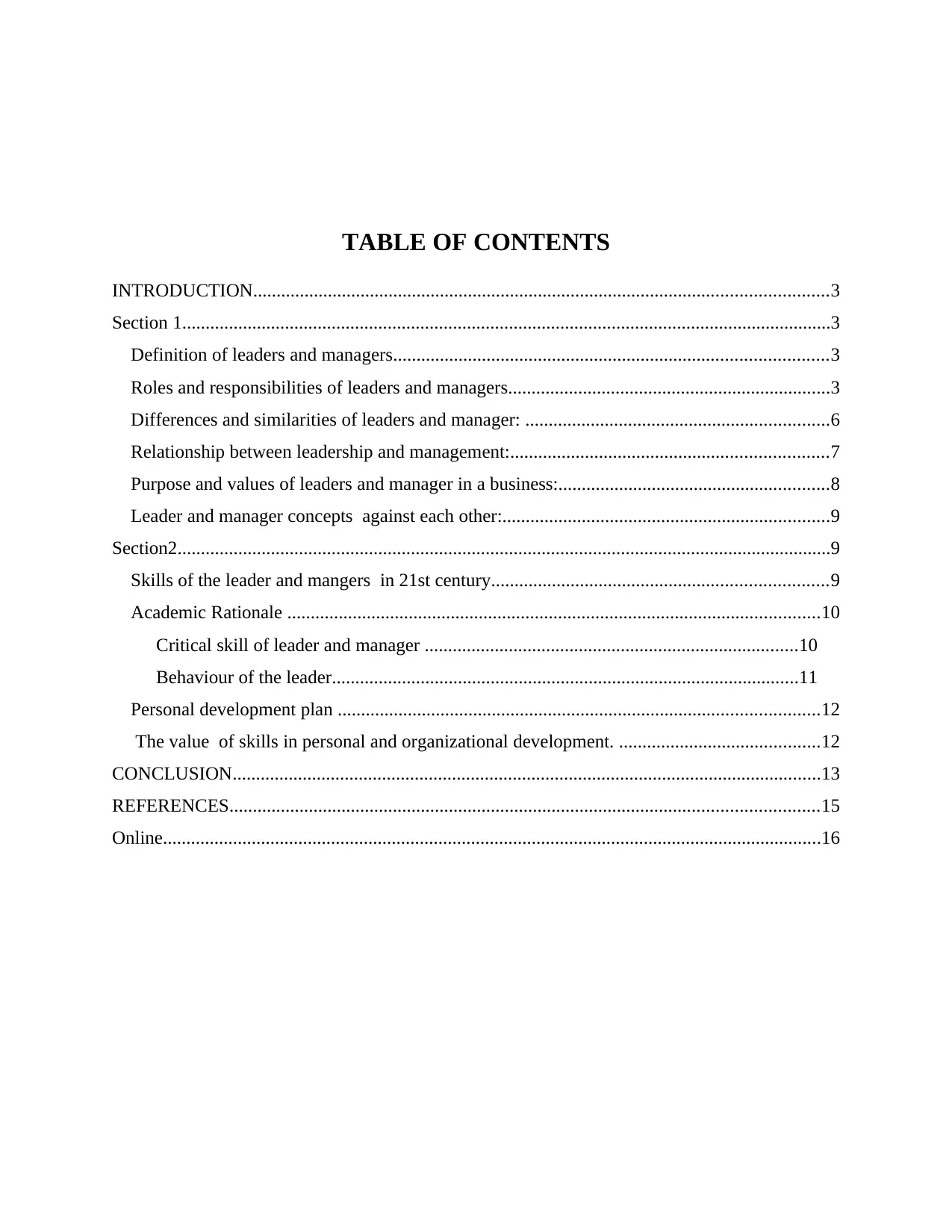
TABLE OF CONTENTS
INTRODUCTION...........................................................................................................................3
Section 1...........................................................................................................................................3
Definition of leaders and managers.............................................................................................3
Roles and responsibilities of leaders and managers.....................................................................3
Differences and similarities of leaders and manager: .................................................................6
Relationship between leadership and management:....................................................................7
Purpose and values of leaders and manager in a business:..........................................................8
Leader and manager concepts against each other:......................................................................9
Section2............................................................................................................................................9
Skills of the leader and mangers in 21st century........................................................................9
Academic Rationale ..................................................................................................................10
Critical skill of leader and manager ................................................................................10
Behaviour of the leader....................................................................................................11
Personal development plan .......................................................................................................12
The value of skills in personal and organizational development. ...........................................12
CONCLUSION..............................................................................................................................13
REFERENCES..............................................................................................................................15
Online.............................................................................................................................................16
INTRODUCTION...........................................................................................................................3
Section 1...........................................................................................................................................3
Definition of leaders and managers.............................................................................................3
Roles and responsibilities of leaders and managers.....................................................................3
Differences and similarities of leaders and manager: .................................................................6
Relationship between leadership and management:....................................................................7
Purpose and values of leaders and manager in a business:..........................................................8
Leader and manager concepts against each other:......................................................................9
Section2............................................................................................................................................9
Skills of the leader and mangers in 21st century........................................................................9
Academic Rationale ..................................................................................................................10
Critical skill of leader and manager ................................................................................10
Behaviour of the leader....................................................................................................11
Personal development plan .......................................................................................................12
The value of skills in personal and organizational development. ...........................................12
CONCLUSION..............................................................................................................................13
REFERENCES..............................................................................................................................15
Online.............................................................................................................................................16
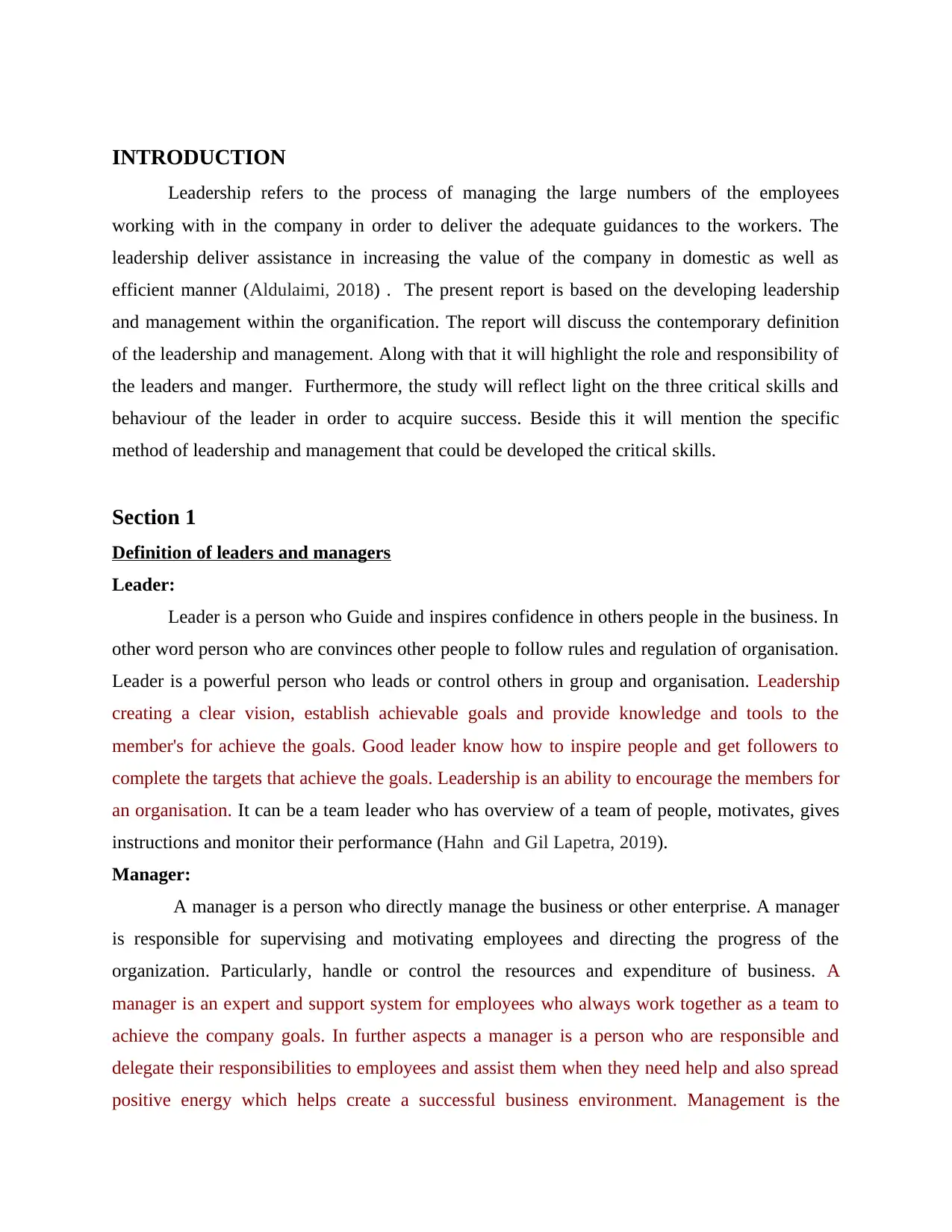
INTRODUCTION
Leadership refers to the process of managing the large numbers of the employees
working with in the company in order to deliver the adequate guidances to the workers. The
leadership deliver assistance in increasing the value of the company in domestic as well as
efficient manner (Aldulaimi, 2018) . The present report is based on the developing leadership
and management within the organification. The report will discuss the contemporary definition
of the leadership and management. Along with that it will highlight the role and responsibility of
the leaders and manger. Furthermore, the study will reflect light on the three critical skills and
behaviour of the leader in order to acquire success. Beside this it will mention the specific
method of leadership and management that could be developed the critical skills.
Section 1
Definition of leaders and managers
Leader:
Leader is a person who Guide and inspires confidence in others people in the business. In
other word person who are convinces other people to follow rules and regulation of organisation.
Leader is a powerful person who leads or control others in group and organisation. Leadership
creating a clear vision, establish achievable goals and provide knowledge and tools to the
member's for achieve the goals. Good leader know how to inspire people and get followers to
complete the targets that achieve the goals. Leadership is an ability to encourage the members for
an organisation. It can be a team leader who has overview of a team of people, motivates, gives
instructions and monitor their performance (Hahn and Gil Lapetra, 2019).
Manager:
A manager is a person who directly manage the business or other enterprise. A manager
is responsible for supervising and motivating employees and directing the progress of the
organization. Particularly, handle or control the resources and expenditure of business. A
manager is an expert and support system for employees who always work together as a team to
achieve the company goals. In further aspects a manager is a person who are responsible and
delegate their responsibilities to employees and assist them when they need help and also spread
positive energy which helps create a successful business environment. Management is the
Leadership refers to the process of managing the large numbers of the employees
working with in the company in order to deliver the adequate guidances to the workers. The
leadership deliver assistance in increasing the value of the company in domestic as well as
efficient manner (Aldulaimi, 2018) . The present report is based on the developing leadership
and management within the organification. The report will discuss the contemporary definition
of the leadership and management. Along with that it will highlight the role and responsibility of
the leaders and manger. Furthermore, the study will reflect light on the three critical skills and
behaviour of the leader in order to acquire success. Beside this it will mention the specific
method of leadership and management that could be developed the critical skills.
Section 1
Definition of leaders and managers
Leader:
Leader is a person who Guide and inspires confidence in others people in the business. In
other word person who are convinces other people to follow rules and regulation of organisation.
Leader is a powerful person who leads or control others in group and organisation. Leadership
creating a clear vision, establish achievable goals and provide knowledge and tools to the
member's for achieve the goals. Good leader know how to inspire people and get followers to
complete the targets that achieve the goals. Leadership is an ability to encourage the members for
an organisation. It can be a team leader who has overview of a team of people, motivates, gives
instructions and monitor their performance (Hahn and Gil Lapetra, 2019).
Manager:
A manager is a person who directly manage the business or other enterprise. A manager
is responsible for supervising and motivating employees and directing the progress of the
organization. Particularly, handle or control the resources and expenditure of business. A
manager is an expert and support system for employees who always work together as a team to
achieve the company goals. In further aspects a manager is a person who are responsible and
delegate their responsibilities to employees and assist them when they need help and also spread
positive energy which helps create a successful business environment. Management is the
⊘ This is a preview!⊘
Do you want full access?
Subscribe today to unlock all pages.

Trusted by 1+ million students worldwide
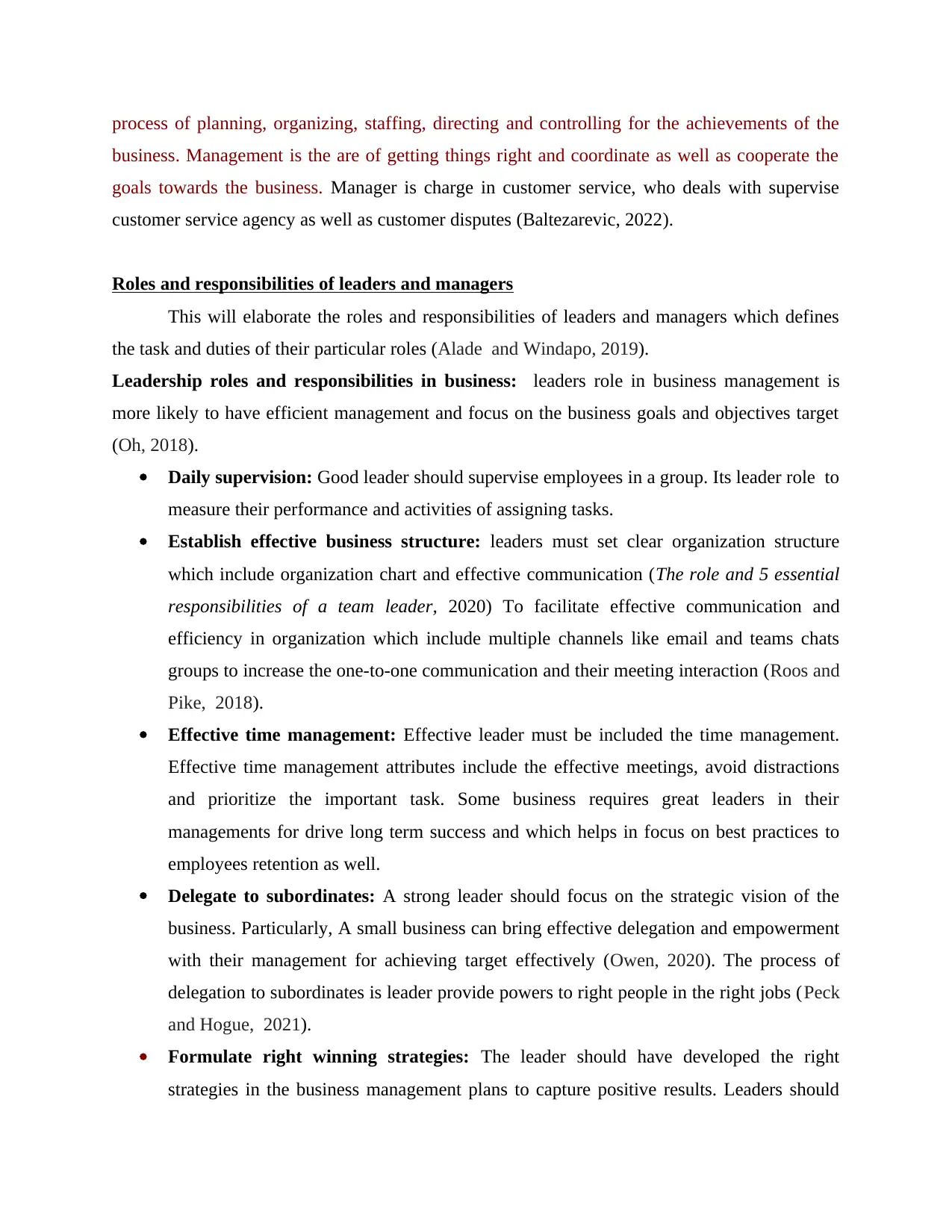
process of planning, organizing, staffing, directing and controlling for the achievements of the
business. Management is the are of getting things right and coordinate as well as cooperate the
goals towards the business. Manager is charge in customer service, who deals with supervise
customer service agency as well as customer disputes (Baltezarevic, 2022).
Roles and responsibilities of leaders and managers
This will elaborate the roles and responsibilities of leaders and managers which defines
the task and duties of their particular roles (Alade and Windapo, 2019).
Leadership roles and responsibilities in business: leaders role in business management is
more likely to have efficient management and focus on the business goals and objectives target
(Oh, 2018).
Daily supervision: Good leader should supervise employees in a group. Its leader role to
measure their performance and activities of assigning tasks.
Establish effective business structure: leaders must set clear organization structure
which include organization chart and effective communication (The role and 5 essential
responsibilities of a team leader, 2020) To facilitate effective communication and
efficiency in organization which include multiple channels like email and teams chats
groups to increase the one-to-one communication and their meeting interaction (Roos and
Pike, 2018).
Effective time management: Effective leader must be included the time management.
Effective time management attributes include the effective meetings, avoid distractions
and prioritize the important task. Some business requires great leaders in their
managements for drive long term success and which helps in focus on best practices to
employees retention as well.
Delegate to subordinates: A strong leader should focus on the strategic vision of the
business. Particularly, A small business can bring effective delegation and empowerment
with their management for achieving target effectively (Owen, 2020). The process of
delegation to subordinates is leader provide powers to right people in the right jobs (Peck
and Hogue, 2021).
Formulate right winning strategies: The leader should have developed the right
strategies in the business management plans to capture positive results. Leaders should
business. Management is the are of getting things right and coordinate as well as cooperate the
goals towards the business. Manager is charge in customer service, who deals with supervise
customer service agency as well as customer disputes (Baltezarevic, 2022).
Roles and responsibilities of leaders and managers
This will elaborate the roles and responsibilities of leaders and managers which defines
the task and duties of their particular roles (Alade and Windapo, 2019).
Leadership roles and responsibilities in business: leaders role in business management is
more likely to have efficient management and focus on the business goals and objectives target
(Oh, 2018).
Daily supervision: Good leader should supervise employees in a group. Its leader role to
measure their performance and activities of assigning tasks.
Establish effective business structure: leaders must set clear organization structure
which include organization chart and effective communication (The role and 5 essential
responsibilities of a team leader, 2020) To facilitate effective communication and
efficiency in organization which include multiple channels like email and teams chats
groups to increase the one-to-one communication and their meeting interaction (Roos and
Pike, 2018).
Effective time management: Effective leader must be included the time management.
Effective time management attributes include the effective meetings, avoid distractions
and prioritize the important task. Some business requires great leaders in their
managements for drive long term success and which helps in focus on best practices to
employees retention as well.
Delegate to subordinates: A strong leader should focus on the strategic vision of the
business. Particularly, A small business can bring effective delegation and empowerment
with their management for achieving target effectively (Owen, 2020). The process of
delegation to subordinates is leader provide powers to right people in the right jobs (Peck
and Hogue, 2021).
Formulate right winning strategies: The leader should have developed the right
strategies in the business management plans to capture positive results. Leaders should
Paraphrase This Document
Need a fresh take? Get an instant paraphrase of this document with our AI Paraphraser
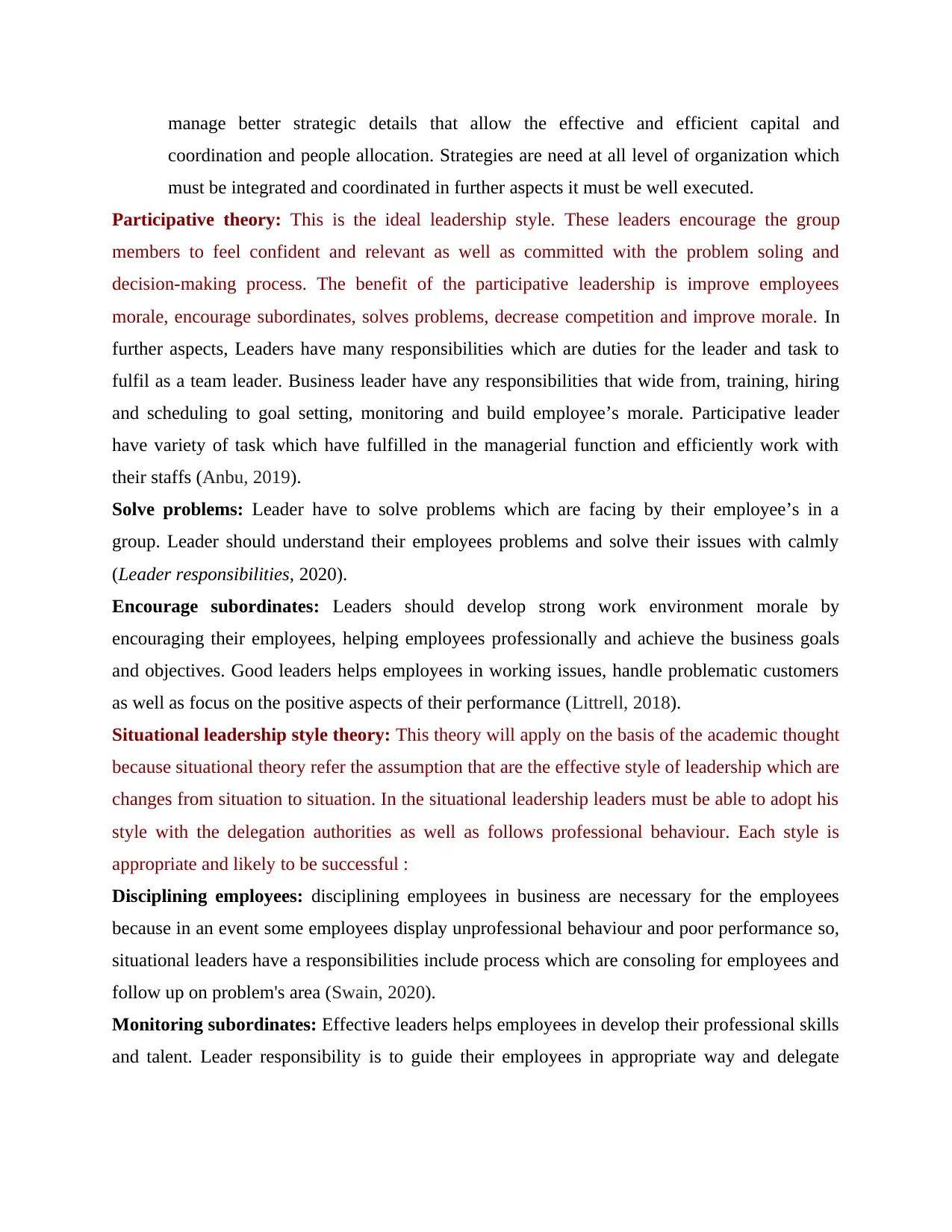
manage better strategic details that allow the effective and efficient capital and
coordination and people allocation. Strategies are need at all level of organization which
must be integrated and coordinated in further aspects it must be well executed.
Participative theory: This is the ideal leadership style. These leaders encourage the group
members to feel confident and relevant as well as committed with the problem soling and
decision-making process. The benefit of the participative leadership is improve employees
morale, encourage subordinates, solves problems, decrease competition and improve morale. In
further aspects, Leaders have many responsibilities which are duties for the leader and task to
fulfil as a team leader. Business leader have any responsibilities that wide from, training, hiring
and scheduling to goal setting, monitoring and build employee’s morale. Participative leader
have variety of task which have fulfilled in the managerial function and efficiently work with
their staffs (Anbu, 2019).
Solve problems: Leader have to solve problems which are facing by their employee’s in a
group. Leader should understand their employees problems and solve their issues with calmly
(Leader responsibilities, 2020).
Encourage subordinates: Leaders should develop strong work environment morale by
encouraging their employees, helping employees professionally and achieve the business goals
and objectives. Good leaders helps employees in working issues, handle problematic customers
as well as focus on the positive aspects of their performance (Littrell, 2018).
Situational leadership style theory: This theory will apply on the basis of the academic thought
because situational theory refer the assumption that are the effective style of leadership which are
changes from situation to situation. In the situational leadership leaders must be able to adopt his
style with the delegation authorities as well as follows professional behaviour. Each style is
appropriate and likely to be successful :
Disciplining employees: disciplining employees in business are necessary for the employees
because in an event some employees display unprofessional behaviour and poor performance so,
situational leaders have a responsibilities include process which are consoling for employees and
follow up on problem's area (Swain, 2020).
Monitoring subordinates: Effective leaders helps employees in develop their professional skills
and talent. Leader responsibility is to guide their employees in appropriate way and delegate
coordination and people allocation. Strategies are need at all level of organization which
must be integrated and coordinated in further aspects it must be well executed.
Participative theory: This is the ideal leadership style. These leaders encourage the group
members to feel confident and relevant as well as committed with the problem soling and
decision-making process. The benefit of the participative leadership is improve employees
morale, encourage subordinates, solves problems, decrease competition and improve morale. In
further aspects, Leaders have many responsibilities which are duties for the leader and task to
fulfil as a team leader. Business leader have any responsibilities that wide from, training, hiring
and scheduling to goal setting, monitoring and build employee’s morale. Participative leader
have variety of task which have fulfilled in the managerial function and efficiently work with
their staffs (Anbu, 2019).
Solve problems: Leader have to solve problems which are facing by their employee’s in a
group. Leader should understand their employees problems and solve their issues with calmly
(Leader responsibilities, 2020).
Encourage subordinates: Leaders should develop strong work environment morale by
encouraging their employees, helping employees professionally and achieve the business goals
and objectives. Good leaders helps employees in working issues, handle problematic customers
as well as focus on the positive aspects of their performance (Littrell, 2018).
Situational leadership style theory: This theory will apply on the basis of the academic thought
because situational theory refer the assumption that are the effective style of leadership which are
changes from situation to situation. In the situational leadership leaders must be able to adopt his
style with the delegation authorities as well as follows professional behaviour. Each style is
appropriate and likely to be successful :
Disciplining employees: disciplining employees in business are necessary for the employees
because in an event some employees display unprofessional behaviour and poor performance so,
situational leaders have a responsibilities include process which are consoling for employees and
follow up on problem's area (Swain, 2020).
Monitoring subordinates: Effective leaders helps employees in develop their professional skills
and talent. Leader responsibility is to guide their employees in appropriate way and delegate
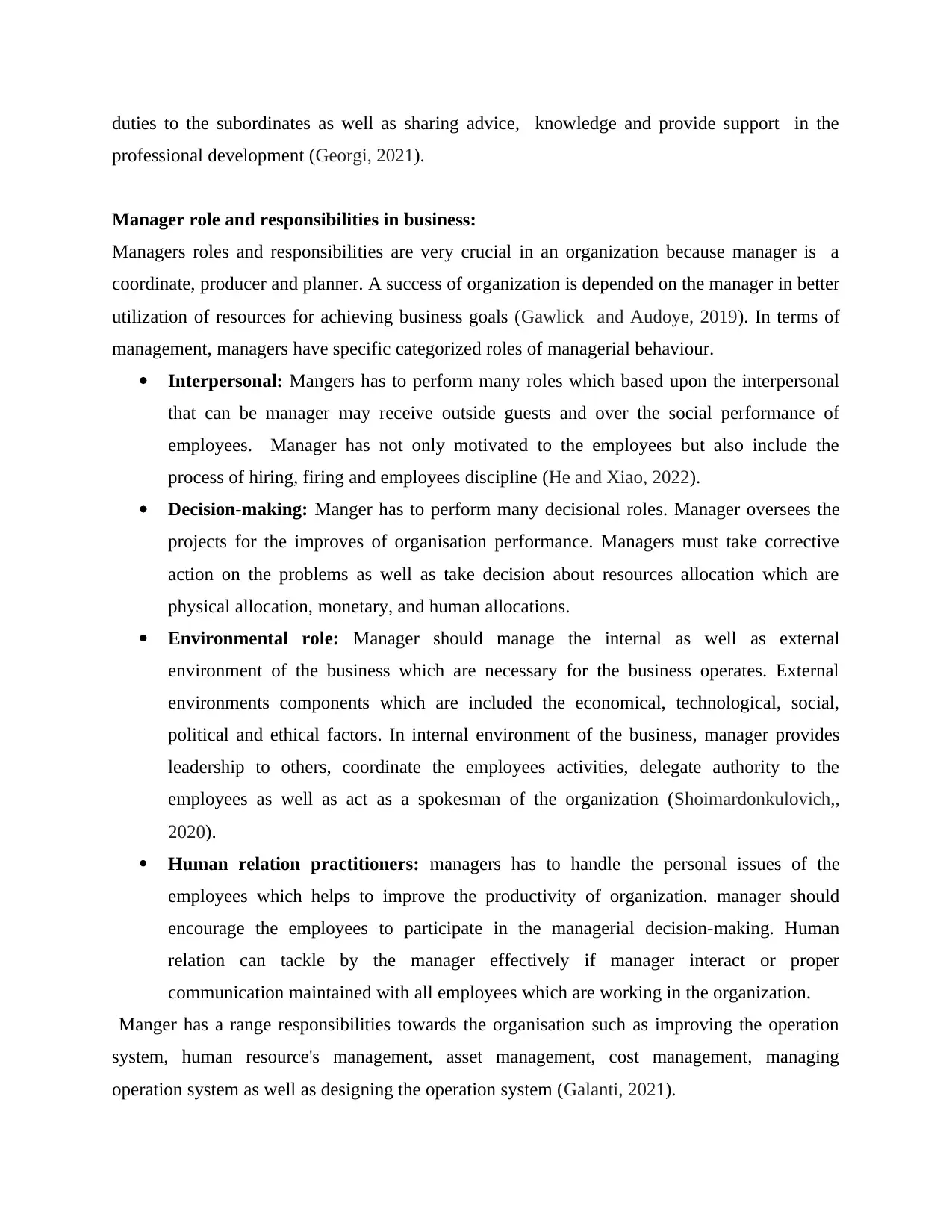
duties to the subordinates as well as sharing advice, knowledge and provide support in the
professional development (Georgi, 2021).
Manager role and responsibilities in business:
Managers roles and responsibilities are very crucial in an organization because manager is a
coordinate, producer and planner. A success of organization is depended on the manager in better
utilization of resources for achieving business goals (Gawlick and Audoye, 2019). In terms of
management, managers have specific categorized roles of managerial behaviour.
Interpersonal: Mangers has to perform many roles which based upon the interpersonal
that can be manager may receive outside guests and over the social performance of
employees. Manager has not only motivated to the employees but also include the
process of hiring, firing and employees discipline (He and Xiao, 2022).
Decision-making: Manger has to perform many decisional roles. Manager oversees the
projects for the improves of organisation performance. Managers must take corrective
action on the problems as well as take decision about resources allocation which are
physical allocation, monetary, and human allocations.
Environmental role: Manager should manage the internal as well as external
environment of the business which are necessary for the business operates. External
environments components which are included the economical, technological, social,
political and ethical factors. In internal environment of the business, manager provides
leadership to others, coordinate the employees activities, delegate authority to the
employees as well as act as a spokesman of the organization (Shoimardonkulovich,,
2020).
Human relation practitioners: managers has to handle the personal issues of the
employees which helps to improve the productivity of organization. manager should
encourage the employees to participate in the managerial decision-making. Human
relation can tackle by the manager effectively if manager interact or proper
communication maintained with all employees which are working in the organization.
Manger has a range responsibilities towards the organisation such as improving the operation
system, human resource's management, asset management, cost management, managing
operation system as well as designing the operation system (Galanti, 2021).
professional development (Georgi, 2021).
Manager role and responsibilities in business:
Managers roles and responsibilities are very crucial in an organization because manager is a
coordinate, producer and planner. A success of organization is depended on the manager in better
utilization of resources for achieving business goals (Gawlick and Audoye, 2019). In terms of
management, managers have specific categorized roles of managerial behaviour.
Interpersonal: Mangers has to perform many roles which based upon the interpersonal
that can be manager may receive outside guests and over the social performance of
employees. Manager has not only motivated to the employees but also include the
process of hiring, firing and employees discipline (He and Xiao, 2022).
Decision-making: Manger has to perform many decisional roles. Manager oversees the
projects for the improves of organisation performance. Managers must take corrective
action on the problems as well as take decision about resources allocation which are
physical allocation, monetary, and human allocations.
Environmental role: Manager should manage the internal as well as external
environment of the business which are necessary for the business operates. External
environments components which are included the economical, technological, social,
political and ethical factors. In internal environment of the business, manager provides
leadership to others, coordinate the employees activities, delegate authority to the
employees as well as act as a spokesman of the organization (Shoimardonkulovich,,
2020).
Human relation practitioners: managers has to handle the personal issues of the
employees which helps to improve the productivity of organization. manager should
encourage the employees to participate in the managerial decision-making. Human
relation can tackle by the manager effectively if manager interact or proper
communication maintained with all employees which are working in the organization.
Manger has a range responsibilities towards the organisation such as improving the operation
system, human resource's management, asset management, cost management, managing
operation system as well as designing the operation system (Galanti, 2021).
⊘ This is a preview!⊘
Do you want full access?
Subscribe today to unlock all pages.

Trusted by 1+ million students worldwide
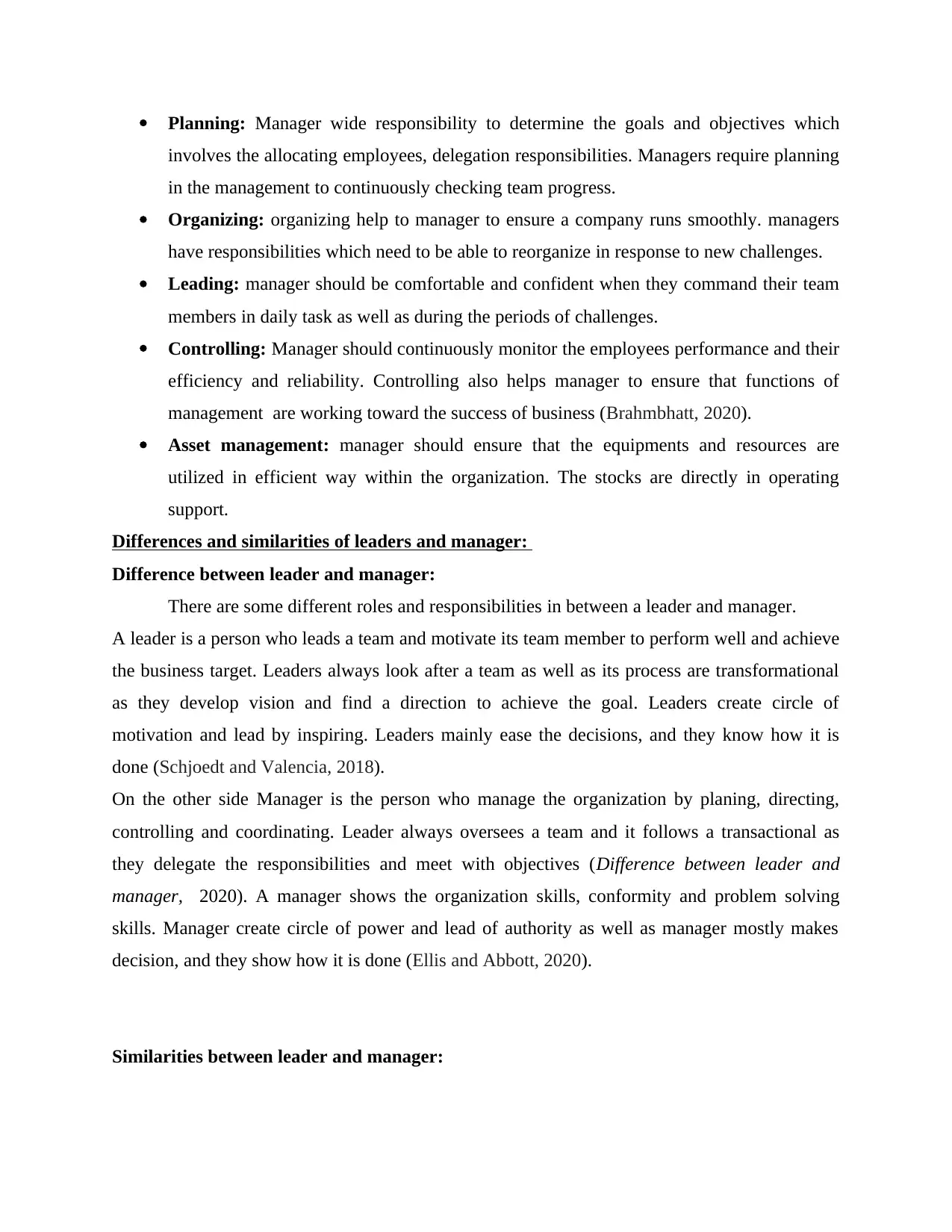
Planning: Manager wide responsibility to determine the goals and objectives which
involves the allocating employees, delegation responsibilities. Managers require planning
in the management to continuously checking team progress.
Organizing: organizing help to manager to ensure a company runs smoothly. managers
have responsibilities which need to be able to reorganize in response to new challenges.
Leading: manager should be comfortable and confident when they command their team
members in daily task as well as during the periods of challenges.
Controlling: Manager should continuously monitor the employees performance and their
efficiency and reliability. Controlling also helps manager to ensure that functions of
management are working toward the success of business (Brahmbhatt, 2020).
Asset management: manager should ensure that the equipments and resources are
utilized in efficient way within the organization. The stocks are directly in operating
support.
Differences and similarities of leaders and manager:
Difference between leader and manager:
There are some different roles and responsibilities in between a leader and manager.
A leader is a person who leads a team and motivate its team member to perform well and achieve
the business target. Leaders always look after a team as well as its process are transformational
as they develop vision and find a direction to achieve the goal. Leaders create circle of
motivation and lead by inspiring. Leaders mainly ease the decisions, and they know how it is
done (Schjoedt and Valencia, 2018).
On the other side Manager is the person who manage the organization by planing, directing,
controlling and coordinating. Leader always oversees a team and it follows a transactional as
they delegate the responsibilities and meet with objectives (Difference between leader and
manager, 2020). A manager shows the organization skills, conformity and problem solving
skills. Manager create circle of power and lead of authority as well as manager mostly makes
decision, and they show how it is done (Ellis and Abbott, 2020).
Similarities between leader and manager:
involves the allocating employees, delegation responsibilities. Managers require planning
in the management to continuously checking team progress.
Organizing: organizing help to manager to ensure a company runs smoothly. managers
have responsibilities which need to be able to reorganize in response to new challenges.
Leading: manager should be comfortable and confident when they command their team
members in daily task as well as during the periods of challenges.
Controlling: Manager should continuously monitor the employees performance and their
efficiency and reliability. Controlling also helps manager to ensure that functions of
management are working toward the success of business (Brahmbhatt, 2020).
Asset management: manager should ensure that the equipments and resources are
utilized in efficient way within the organization. The stocks are directly in operating
support.
Differences and similarities of leaders and manager:
Difference between leader and manager:
There are some different roles and responsibilities in between a leader and manager.
A leader is a person who leads a team and motivate its team member to perform well and achieve
the business target. Leaders always look after a team as well as its process are transformational
as they develop vision and find a direction to achieve the goal. Leaders create circle of
motivation and lead by inspiring. Leaders mainly ease the decisions, and they know how it is
done (Schjoedt and Valencia, 2018).
On the other side Manager is the person who manage the organization by planing, directing,
controlling and coordinating. Leader always oversees a team and it follows a transactional as
they delegate the responsibilities and meet with objectives (Difference between leader and
manager, 2020). A manager shows the organization skills, conformity and problem solving
skills. Manager create circle of power and lead of authority as well as manager mostly makes
decision, and they show how it is done (Ellis and Abbott, 2020).
Similarities between leader and manager:
Paraphrase This Document
Need a fresh take? Get an instant paraphrase of this document with our AI Paraphraser
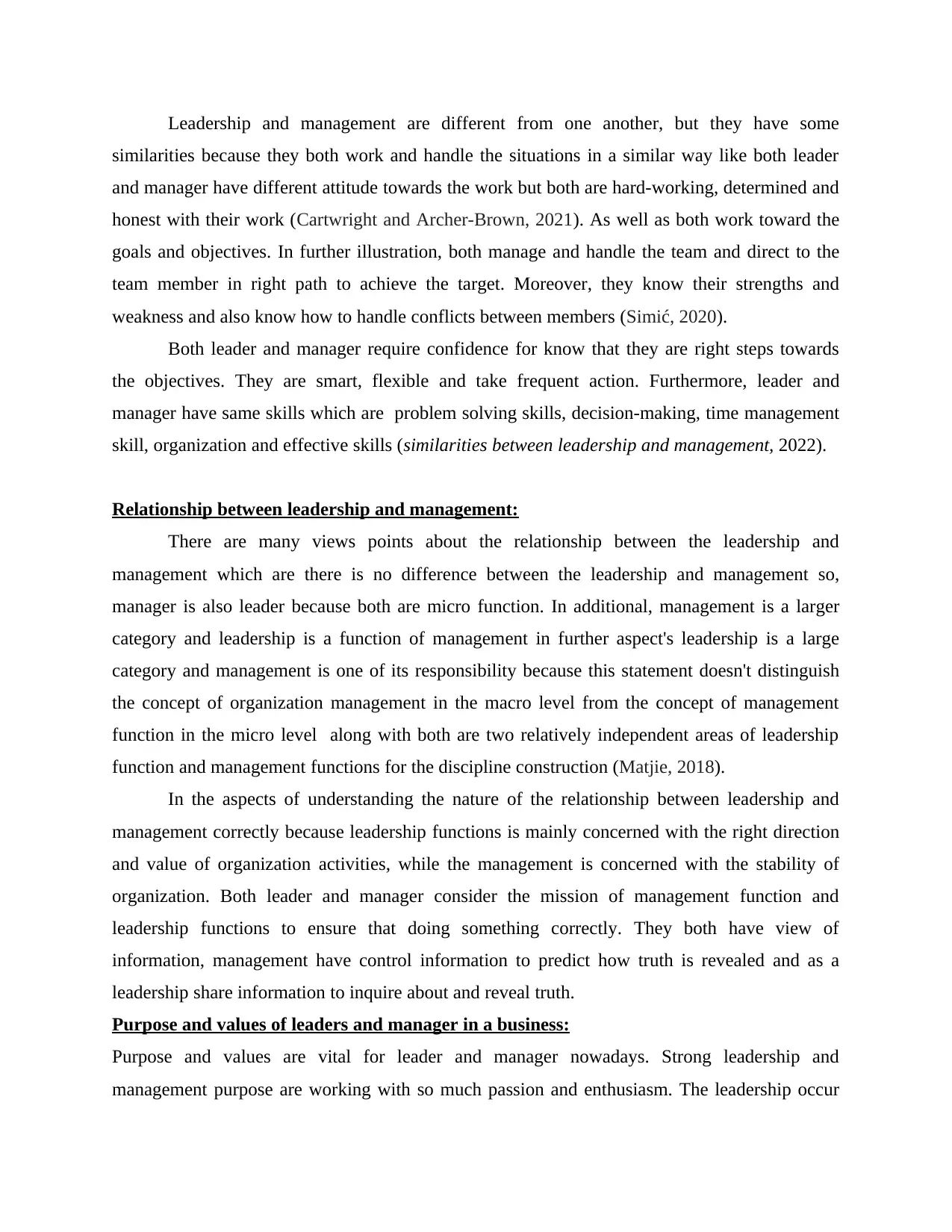
Leadership and management are different from one another, but they have some
similarities because they both work and handle the situations in a similar way like both leader
and manager have different attitude towards the work but both are hard-working, determined and
honest with their work (Cartwright and Archer-Brown, 2021). As well as both work toward the
goals and objectives. In further illustration, both manage and handle the team and direct to the
team member in right path to achieve the target. Moreover, they know their strengths and
weakness and also know how to handle conflicts between members (Simić, 2020).
Both leader and manager require confidence for know that they are right steps towards
the objectives. They are smart, flexible and take frequent action. Furthermore, leader and
manager have same skills which are problem solving skills, decision-making, time management
skill, organization and effective skills (similarities between leadership and management, 2022).
Relationship between leadership and management:
There are many views points about the relationship between the leadership and
management which are there is no difference between the leadership and management so,
manager is also leader because both are micro function. In additional, management is a larger
category and leadership is a function of management in further aspect's leadership is a large
category and management is one of its responsibility because this statement doesn't distinguish
the concept of organization management in the macro level from the concept of management
function in the micro level along with both are two relatively independent areas of leadership
function and management functions for the discipline construction (Matjie, 2018).
In the aspects of understanding the nature of the relationship between leadership and
management correctly because leadership functions is mainly concerned with the right direction
and value of organization activities, while the management is concerned with the stability of
organization. Both leader and manager consider the mission of management function and
leadership functions to ensure that doing something correctly. They both have view of
information, management have control information to predict how truth is revealed and as a
leadership share information to inquire about and reveal truth.
Purpose and values of leaders and manager in a business:
Purpose and values are vital for leader and manager nowadays. Strong leadership and
management purpose are working with so much passion and enthusiasm. The leadership occur
similarities because they both work and handle the situations in a similar way like both leader
and manager have different attitude towards the work but both are hard-working, determined and
honest with their work (Cartwright and Archer-Brown, 2021). As well as both work toward the
goals and objectives. In further illustration, both manage and handle the team and direct to the
team member in right path to achieve the target. Moreover, they know their strengths and
weakness and also know how to handle conflicts between members (Simić, 2020).
Both leader and manager require confidence for know that they are right steps towards
the objectives. They are smart, flexible and take frequent action. Furthermore, leader and
manager have same skills which are problem solving skills, decision-making, time management
skill, organization and effective skills (similarities between leadership and management, 2022).
Relationship between leadership and management:
There are many views points about the relationship between the leadership and
management which are there is no difference between the leadership and management so,
manager is also leader because both are micro function. In additional, management is a larger
category and leadership is a function of management in further aspect's leadership is a large
category and management is one of its responsibility because this statement doesn't distinguish
the concept of organization management in the macro level from the concept of management
function in the micro level along with both are two relatively independent areas of leadership
function and management functions for the discipline construction (Matjie, 2018).
In the aspects of understanding the nature of the relationship between leadership and
management correctly because leadership functions is mainly concerned with the right direction
and value of organization activities, while the management is concerned with the stability of
organization. Both leader and manager consider the mission of management function and
leadership functions to ensure that doing something correctly. They both have view of
information, management have control information to predict how truth is revealed and as a
leadership share information to inquire about and reveal truth.
Purpose and values of leaders and manager in a business:
Purpose and values are vital for leader and manager nowadays. Strong leadership and
management purpose are working with so much passion and enthusiasm. The leadership occur
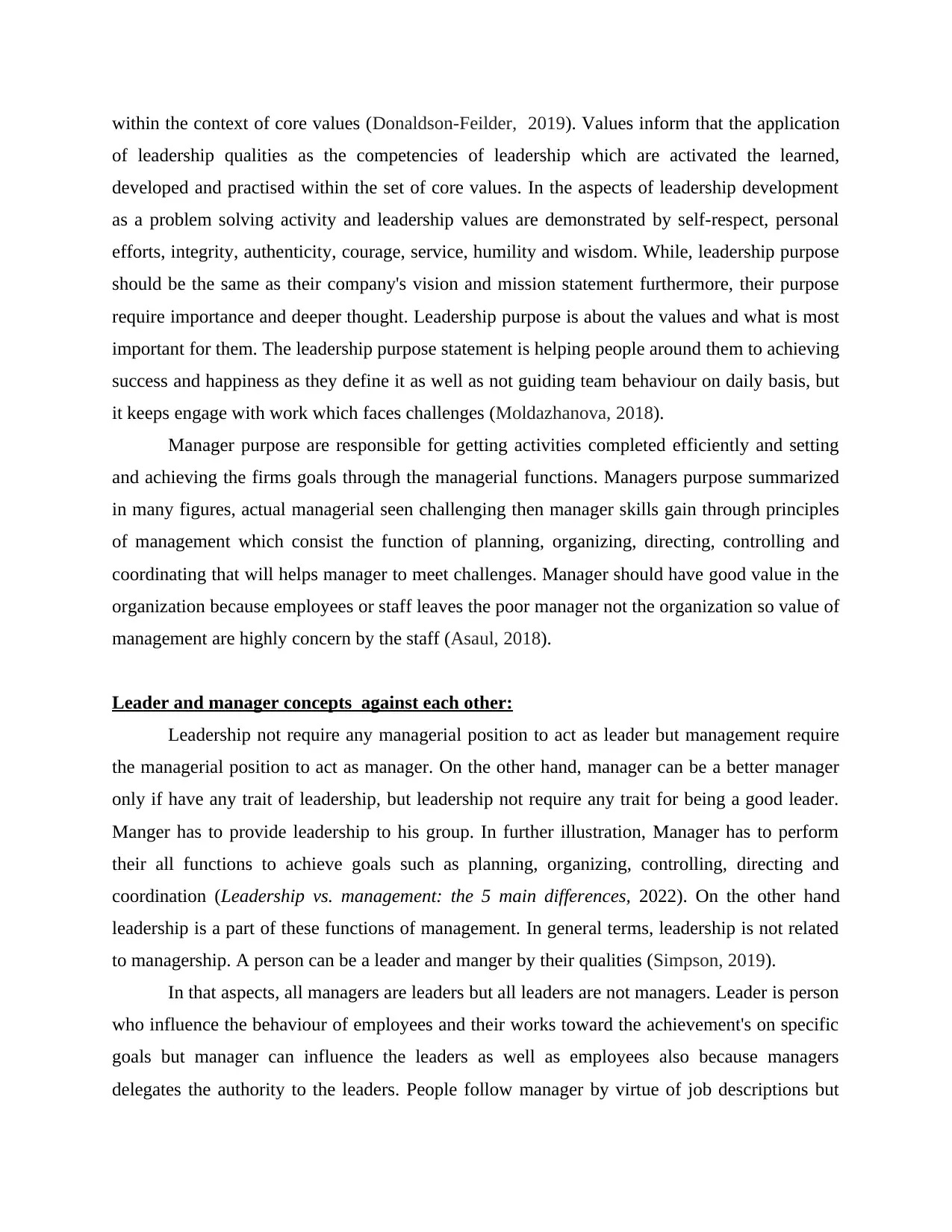
within the context of core values (Donaldson-Feilder, 2019). Values inform that the application
of leadership qualities as the competencies of leadership which are activated the learned,
developed and practised within the set of core values. In the aspects of leadership development
as a problem solving activity and leadership values are demonstrated by self-respect, personal
efforts, integrity, authenticity, courage, service, humility and wisdom. While, leadership purpose
should be the same as their company's vision and mission statement furthermore, their purpose
require importance and deeper thought. Leadership purpose is about the values and what is most
important for them. The leadership purpose statement is helping people around them to achieving
success and happiness as they define it as well as not guiding team behaviour on daily basis, but
it keeps engage with work which faces challenges (Moldazhanova, 2018).
Manager purpose are responsible for getting activities completed efficiently and setting
and achieving the firms goals through the managerial functions. Managers purpose summarized
in many figures, actual managerial seen challenging then manager skills gain through principles
of management which consist the function of planning, organizing, directing, controlling and
coordinating that will helps manager to meet challenges. Manager should have good value in the
organization because employees or staff leaves the poor manager not the organization so value of
management are highly concern by the staff (Asaul, 2018).
Leader and manager concepts against each other:
Leadership not require any managerial position to act as leader but management require
the managerial position to act as manager. On the other hand, manager can be a better manager
only if have any trait of leadership, but leadership not require any trait for being a good leader.
Manger has to provide leadership to his group. In further illustration, Manager has to perform
their all functions to achieve goals such as planning, organizing, controlling, directing and
coordination (Leadership vs. management: the 5 main differences, 2022). On the other hand
leadership is a part of these functions of management. In general terms, leadership is not related
to managership. A person can be a leader and manger by their qualities (Simpson, 2019).
In that aspects, all managers are leaders but all leaders are not managers. Leader is person
who influence the behaviour of employees and their works toward the achievement's on specific
goals but manager can influence the leaders as well as employees also because managers
delegates the authority to the leaders. People follow manager by virtue of job descriptions but
of leadership qualities as the competencies of leadership which are activated the learned,
developed and practised within the set of core values. In the aspects of leadership development
as a problem solving activity and leadership values are demonstrated by self-respect, personal
efforts, integrity, authenticity, courage, service, humility and wisdom. While, leadership purpose
should be the same as their company's vision and mission statement furthermore, their purpose
require importance and deeper thought. Leadership purpose is about the values and what is most
important for them. The leadership purpose statement is helping people around them to achieving
success and happiness as they define it as well as not guiding team behaviour on daily basis, but
it keeps engage with work which faces challenges (Moldazhanova, 2018).
Manager purpose are responsible for getting activities completed efficiently and setting
and achieving the firms goals through the managerial functions. Managers purpose summarized
in many figures, actual managerial seen challenging then manager skills gain through principles
of management which consist the function of planning, organizing, directing, controlling and
coordinating that will helps manager to meet challenges. Manager should have good value in the
organization because employees or staff leaves the poor manager not the organization so value of
management are highly concern by the staff (Asaul, 2018).
Leader and manager concepts against each other:
Leadership not require any managerial position to act as leader but management require
the managerial position to act as manager. On the other hand, manager can be a better manager
only if have any trait of leadership, but leadership not require any trait for being a good leader.
Manger has to provide leadership to his group. In further illustration, Manager has to perform
their all functions to achieve goals such as planning, organizing, controlling, directing and
coordination (Leadership vs. management: the 5 main differences, 2022). On the other hand
leadership is a part of these functions of management. In general terms, leadership is not related
to managership. A person can be a leader and manger by their qualities (Simpson, 2019).
In that aspects, all managers are leaders but all leaders are not managers. Leader is person
who influence the behaviour of employees and their works toward the achievement's on specific
goals but manager can influence the leaders as well as employees also because managers
delegates the authority to the leaders. People follow manager by virtue of job descriptions but
⊘ This is a preview!⊘
Do you want full access?
Subscribe today to unlock all pages.

Trusted by 1+ million students worldwide
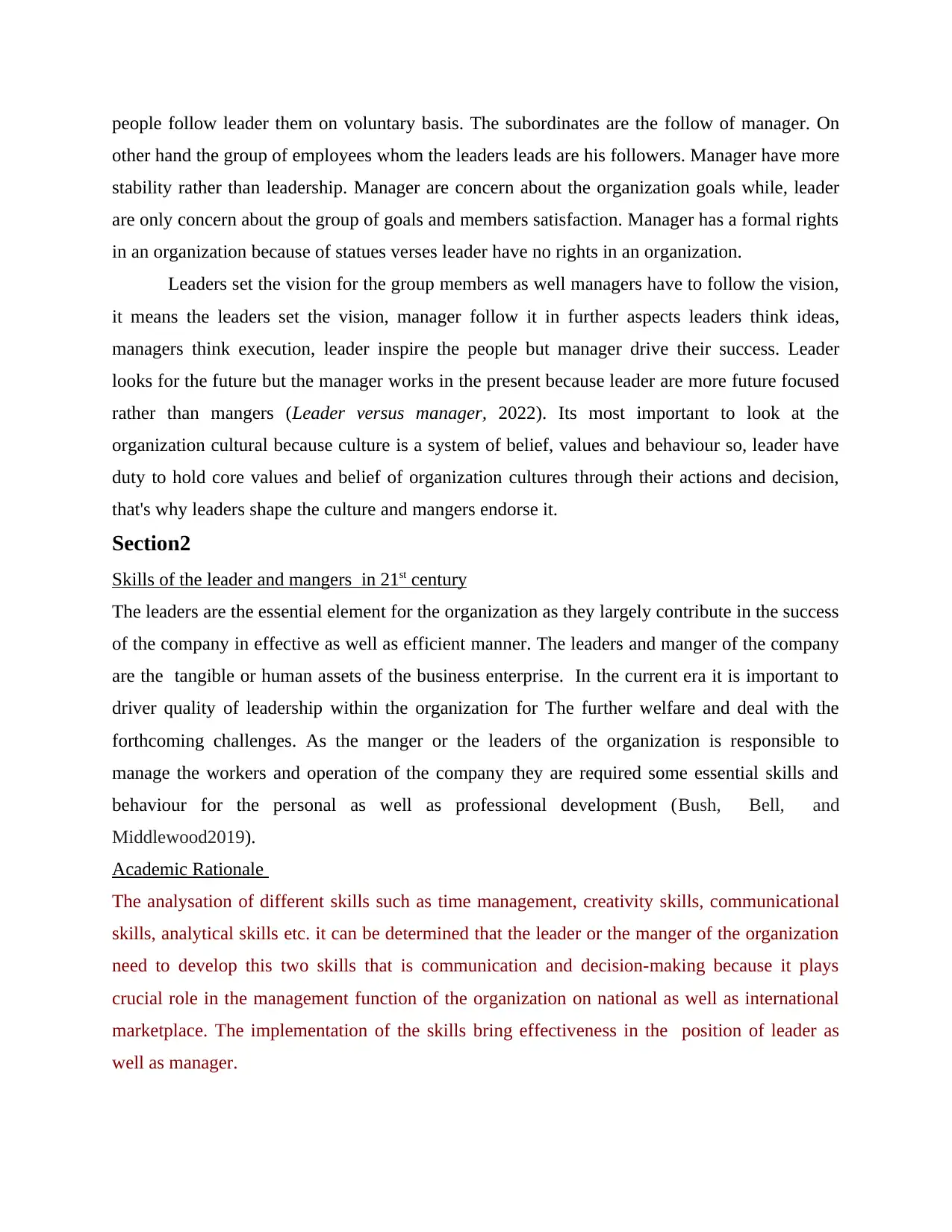
people follow leader them on voluntary basis. The subordinates are the follow of manager. On
other hand the group of employees whom the leaders leads are his followers. Manager have more
stability rather than leadership. Manager are concern about the organization goals while, leader
are only concern about the group of goals and members satisfaction. Manager has a formal rights
in an organization because of statues verses leader have no rights in an organization.
Leaders set the vision for the group members as well managers have to follow the vision,
it means the leaders set the vision, manager follow it in further aspects leaders think ideas,
managers think execution, leader inspire the people but manager drive their success. Leader
looks for the future but the manager works in the present because leader are more future focused
rather than mangers (Leader versus manager, 2022). Its most important to look at the
organization cultural because culture is a system of belief, values and behaviour so, leader have
duty to hold core values and belief of organization cultures through their actions and decision,
that's why leaders shape the culture and mangers endorse it.
Section2
Skills of the leader and mangers in 21st century
The leaders are the essential element for the organization as they largely contribute in the success
of the company in effective as well as efficient manner. The leaders and manger of the company
are the tangible or human assets of the business enterprise. In the current era it is important to
driver quality of leadership within the organization for The further welfare and deal with the
forthcoming challenges. As the manger or the leaders of the organization is responsible to
manage the workers and operation of the company they are required some essential skills and
behaviour for the personal as well as professional development (Bush, Bell, and
Middlewood2019).
Academic Rationale
The analysation of different skills such as time management, creativity skills, communicational
skills, analytical skills etc. it can be determined that the leader or the manger of the organization
need to develop this two skills that is communication and decision-making because it plays
crucial role in the management function of the organization on national as well as international
marketplace. The implementation of the skills bring effectiveness in the position of leader as
well as manager.
other hand the group of employees whom the leaders leads are his followers. Manager have more
stability rather than leadership. Manager are concern about the organization goals while, leader
are only concern about the group of goals and members satisfaction. Manager has a formal rights
in an organization because of statues verses leader have no rights in an organization.
Leaders set the vision for the group members as well managers have to follow the vision,
it means the leaders set the vision, manager follow it in further aspects leaders think ideas,
managers think execution, leader inspire the people but manager drive their success. Leader
looks for the future but the manager works in the present because leader are more future focused
rather than mangers (Leader versus manager, 2022). Its most important to look at the
organization cultural because culture is a system of belief, values and behaviour so, leader have
duty to hold core values and belief of organization cultures through their actions and decision,
that's why leaders shape the culture and mangers endorse it.
Section2
Skills of the leader and mangers in 21st century
The leaders are the essential element for the organization as they largely contribute in the success
of the company in effective as well as efficient manner. The leaders and manger of the company
are the tangible or human assets of the business enterprise. In the current era it is important to
driver quality of leadership within the organization for The further welfare and deal with the
forthcoming challenges. As the manger or the leaders of the organization is responsible to
manage the workers and operation of the company they are required some essential skills and
behaviour for the personal as well as professional development (Bush, Bell, and
Middlewood2019).
Academic Rationale
The analysation of different skills such as time management, creativity skills, communicational
skills, analytical skills etc. it can be determined that the leader or the manger of the organization
need to develop this two skills that is communication and decision-making because it plays
crucial role in the management function of the organization on national as well as international
marketplace. The implementation of the skills bring effectiveness in the position of leader as
well as manager.
Paraphrase This Document
Need a fresh take? Get an instant paraphrase of this document with our AI Paraphraser
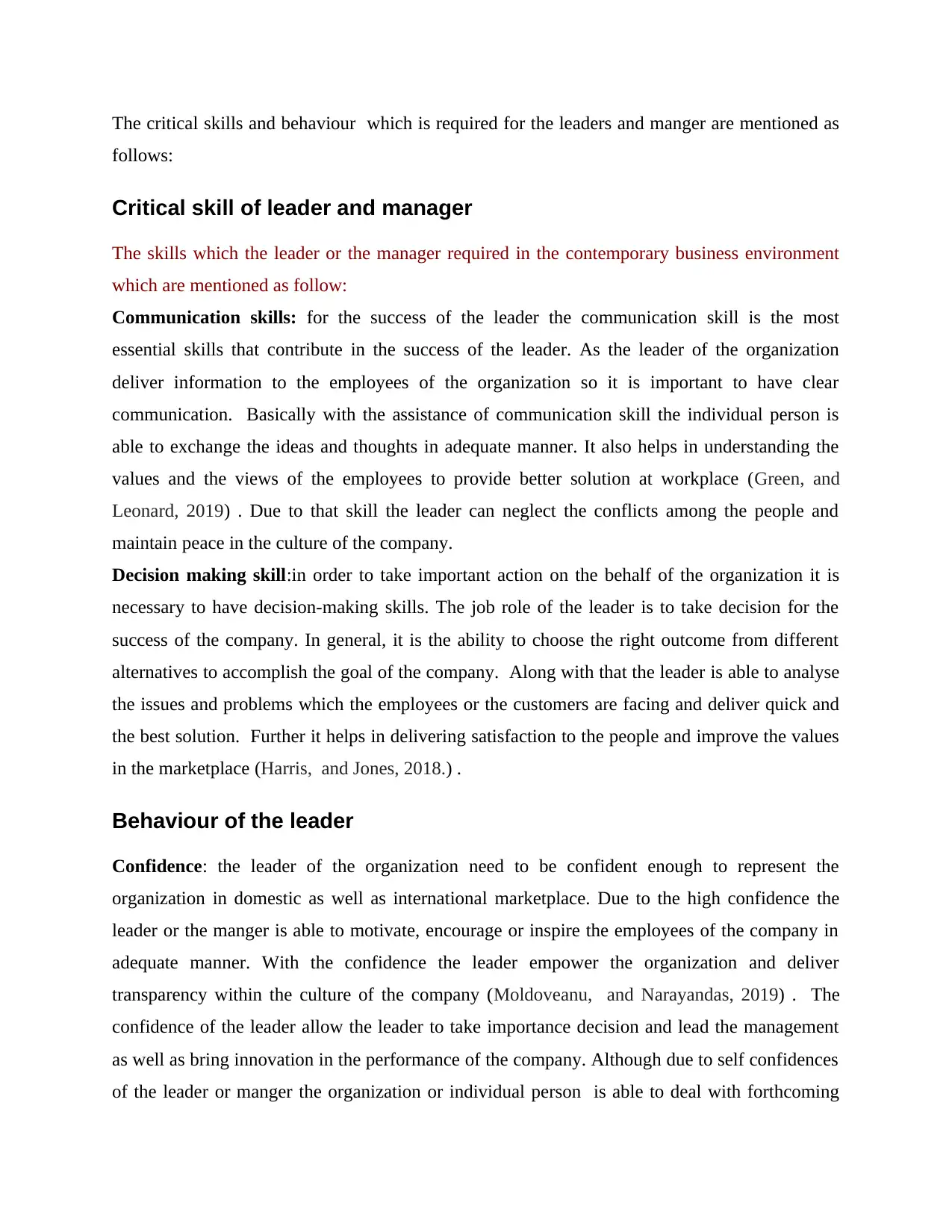
The critical skills and behaviour which is required for the leaders and manger are mentioned as
follows:
Critical skill of leader and manager
The skills which the leader or the manager required in the contemporary business environment
which are mentioned as follow:
Communication skills: for the success of the leader the communication skill is the most
essential skills that contribute in the success of the leader. As the leader of the organization
deliver information to the employees of the organization so it is important to have clear
communication. Basically with the assistance of communication skill the individual person is
able to exchange the ideas and thoughts in adequate manner. It also helps in understanding the
values and the views of the employees to provide better solution at workplace (Green, and
Leonard, 2019) . Due to that skill the leader can neglect the conflicts among the people and
maintain peace in the culture of the company.
Decision making skill:in order to take important action on the behalf of the organization it is
necessary to have decision-making skills. The job role of the leader is to take decision for the
success of the company. In general, it is the ability to choose the right outcome from different
alternatives to accomplish the goal of the company. Along with that the leader is able to analyse
the issues and problems which the employees or the customers are facing and deliver quick and
the best solution. Further it helps in delivering satisfaction to the people and improve the values
in the marketplace (Harris, and Jones, 2018.) .
Behaviour of the leader
Confidence: the leader of the organization need to be confident enough to represent the
organization in domestic as well as international marketplace. Due to the high confidence the
leader or the manger is able to motivate, encourage or inspire the employees of the company in
adequate manner. With the confidence the leader empower the organization and deliver
transparency within the culture of the company (Moldoveanu, and Narayandas, 2019) . The
confidence of the leader allow the leader to take importance decision and lead the management
as well as bring innovation in the performance of the company. Although due to self confidences
of the leader or manger the organization or individual person is able to deal with forthcoming
follows:
Critical skill of leader and manager
The skills which the leader or the manager required in the contemporary business environment
which are mentioned as follow:
Communication skills: for the success of the leader the communication skill is the most
essential skills that contribute in the success of the leader. As the leader of the organization
deliver information to the employees of the organization so it is important to have clear
communication. Basically with the assistance of communication skill the individual person is
able to exchange the ideas and thoughts in adequate manner. It also helps in understanding the
values and the views of the employees to provide better solution at workplace (Green, and
Leonard, 2019) . Due to that skill the leader can neglect the conflicts among the people and
maintain peace in the culture of the company.
Decision making skill:in order to take important action on the behalf of the organization it is
necessary to have decision-making skills. The job role of the leader is to take decision for the
success of the company. In general, it is the ability to choose the right outcome from different
alternatives to accomplish the goal of the company. Along with that the leader is able to analyse
the issues and problems which the employees or the customers are facing and deliver quick and
the best solution. Further it helps in delivering satisfaction to the people and improve the values
in the marketplace (Harris, and Jones, 2018.) .
Behaviour of the leader
Confidence: the leader of the organization need to be confident enough to represent the
organization in domestic as well as international marketplace. Due to the high confidence the
leader or the manger is able to motivate, encourage or inspire the employees of the company in
adequate manner. With the confidence the leader empower the organization and deliver
transparency within the culture of the company (Moldoveanu, and Narayandas, 2019) . The
confidence of the leader allow the leader to take importance decision and lead the management
as well as bring innovation in the performance of the company. Although due to self confidences
of the leader or manger the organization or individual person is able to deal with forthcoming
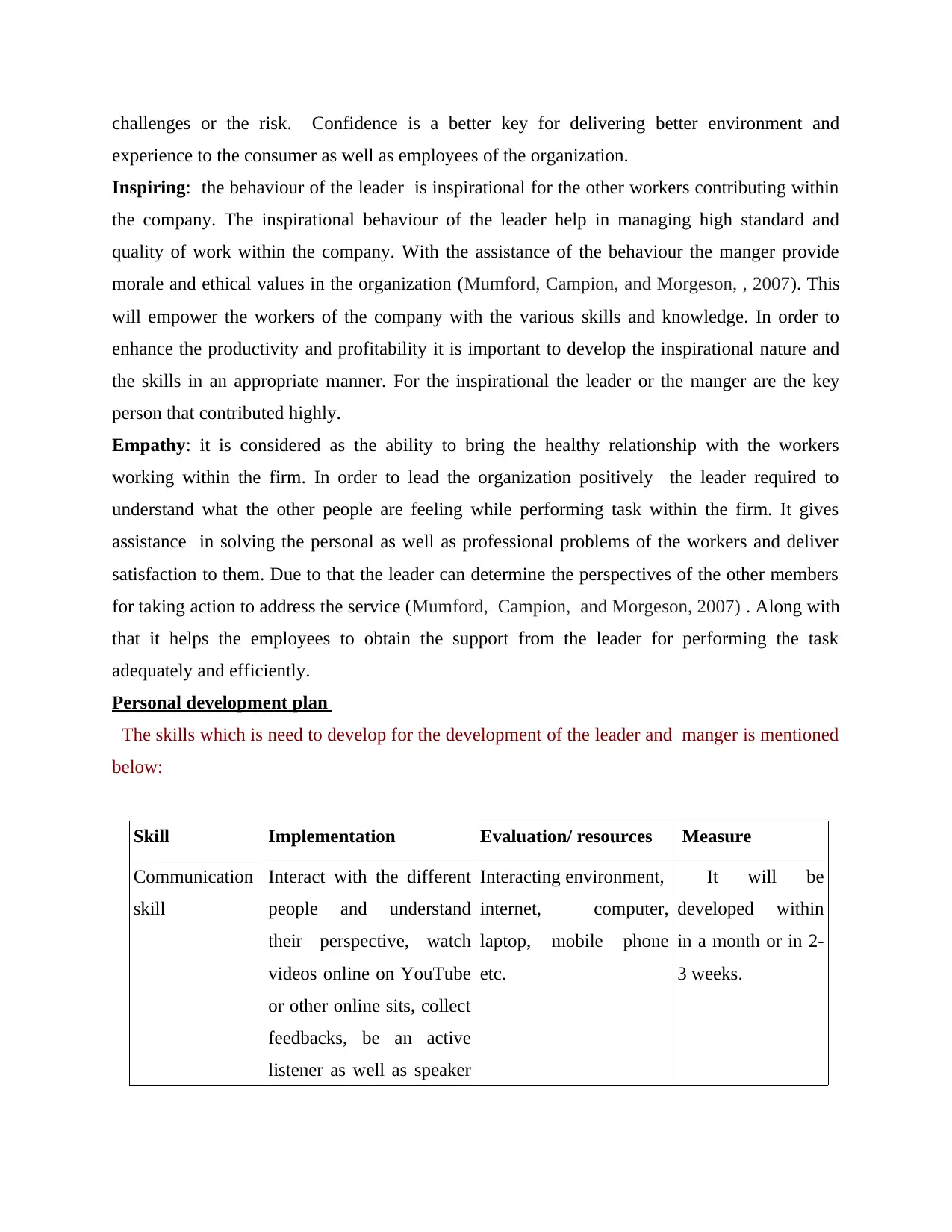
challenges or the risk. Confidence is a better key for delivering better environment and
experience to the consumer as well as employees of the organization.
Inspiring: the behaviour of the leader is inspirational for the other workers contributing within
the company. The inspirational behaviour of the leader help in managing high standard and
quality of work within the company. With the assistance of the behaviour the manger provide
morale and ethical values in the organization (Mumford, Campion, and Morgeson, , 2007). This
will empower the workers of the company with the various skills and knowledge. In order to
enhance the productivity and profitability it is important to develop the inspirational nature and
the skills in an appropriate manner. For the inspirational the leader or the manger are the key
person that contributed highly.
Empathy: it is considered as the ability to bring the healthy relationship with the workers
working within the firm. In order to lead the organization positively the leader required to
understand what the other people are feeling while performing task within the firm. It gives
assistance in solving the personal as well as professional problems of the workers and deliver
satisfaction to them. Due to that the leader can determine the perspectives of the other members
for taking action to address the service (Mumford, Campion, and Morgeson, 2007) . Along with
that it helps the employees to obtain the support from the leader for performing the task
adequately and efficiently.
Personal development plan
The skills which is need to develop for the development of the leader and manger is mentioned
below:
Skill Implementation Evaluation/ resources Measure
Communication
skill
Interact with the different
people and understand
their perspective, watch
videos online on YouTube
or other online sits, collect
feedbacks, be an active
listener as well as speaker
Interacting environment,
internet, computer,
laptop, mobile phone
etc.
It will be
developed within
in a month or in 2-
3 weeks.
experience to the consumer as well as employees of the organization.
Inspiring: the behaviour of the leader is inspirational for the other workers contributing within
the company. The inspirational behaviour of the leader help in managing high standard and
quality of work within the company. With the assistance of the behaviour the manger provide
morale and ethical values in the organization (Mumford, Campion, and Morgeson, , 2007). This
will empower the workers of the company with the various skills and knowledge. In order to
enhance the productivity and profitability it is important to develop the inspirational nature and
the skills in an appropriate manner. For the inspirational the leader or the manger are the key
person that contributed highly.
Empathy: it is considered as the ability to bring the healthy relationship with the workers
working within the firm. In order to lead the organization positively the leader required to
understand what the other people are feeling while performing task within the firm. It gives
assistance in solving the personal as well as professional problems of the workers and deliver
satisfaction to them. Due to that the leader can determine the perspectives of the other members
for taking action to address the service (Mumford, Campion, and Morgeson, 2007) . Along with
that it helps the employees to obtain the support from the leader for performing the task
adequately and efficiently.
Personal development plan
The skills which is need to develop for the development of the leader and manger is mentioned
below:
Skill Implementation Evaluation/ resources Measure
Communication
skill
Interact with the different
people and understand
their perspective, watch
videos online on YouTube
or other online sits, collect
feedbacks, be an active
listener as well as speaker
Interacting environment,
internet, computer,
laptop, mobile phone
etc.
It will be
developed within
in a month or in 2-
3 weeks.
⊘ This is a preview!⊘
Do you want full access?
Subscribe today to unlock all pages.

Trusted by 1+ million students worldwide
1 out of 18
Related Documents
Your All-in-One AI-Powered Toolkit for Academic Success.
+13062052269
info@desklib.com
Available 24*7 on WhatsApp / Email
![[object Object]](/_next/static/media/star-bottom.7253800d.svg)
Unlock your academic potential
Copyright © 2020–2026 A2Z Services. All Rights Reserved. Developed and managed by ZUCOL.




